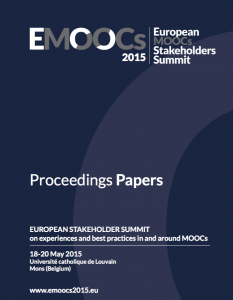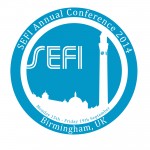Posts tagged conference paper
EMOOCs 2015: Experiences from 18 DelftX MOOCs
 Paper presented at the European Stakeholders summit on experiences and best practices in and around MOOCs in Mons, Belgium (18-20 May 2015).
Paper presented at the European Stakeholders summit on experiences and best practices in and around MOOCs in Mons, Belgium (18-20 May 2015).
Abstract
This paper describes experiences and lessons learned from developing, building and running 18 MOOCs (including 4 reruns) at the Delft University of Technology, namely the selection of courses, the design, development and delivery of courses, innovative educational elements for use in online and in residential teaching, and the generation of data. Overall the development and offering of MOOCs has augmented the awareness, expertise, and innovation regarding online and residential learning, and has contributed to an active and positive spirit of educational innovation. In addition, we saw indications of a positive effect on quality and quantity of enrolment for on-campus programs, gathered data for research and were able to share the university’s knowledge with the world.
Reference
Kiers, J., Jorge, N., (2015). Experiences from 18 DelftX MOOCs in Proceedings Paper EMOOCs 2015 (page 65-70): http://www.emoocs2015.eu/sites/default/files/Papers.pdf
EMOOCs2015: Reconsidering Retention in MOOCs: the Relevance of Formal Assessment and Pedagogy
 Paper presented at the European Stakeholders summit on experiences and best practices in and around MOOCs in Mons, Belgium (18-20 May 2015).
Paper presented at the European Stakeholders summit on experiences and best practices in and around MOOCs in Mons, Belgium (18-20 May 2015).
Abstract
The motivation to enrol in a MOOC is more diverse than the motivation for a conventional course. This diversity requires re-conceptualization of the terms for enrolment, participation, and achievement. The paper addresses the concept of retention and focuses on engagement relative to assessment. Student retention is often used to determine the value of higher education. In this paper we argue that retention data about specific groups of students
can supply valuable insights to improve MOOC design and align expectations. The paper reports three short studies conducted to gain insights into disengagement from assessment, based on the data gathered in the first five DelftX MOOCs. The empirical part of the paper demonstrates that retention rates in relation to formal assessment vary from course to course. In the analysed case, fewer learners disengaged from the formal assessment in the course with highest degree of student autonomy, high learning support and scaffolds. Consistently across courses, learners who received lower grades on the first assessment task, tend to disengage from further assessment.
Reference
De Vries, P., Hennis, T., Skrypnyk, A., (2015). Reconsidering Retention in MOOCs: the Relevance of Formal Assessment and Pedagogy in Proceedings Paper EMOOCs 2015 (page 168-173): http://www.emoocs2015.eu/sites/default/files/Papers.pdf
SEFI2014: Understanding social learning behaviours of xMOOC completers
 Paper presented at the SEFI Conference 2014 in Birmingham, UK.
Paper presented at the SEFI Conference 2014 in Birmingham, UK.
This paper is about the experiences with the first two MOOCs developed and executed at the Delft University of Technology (TUD) on the edX platform. The courses Solar Energy (ET3034TU) and Introduction to Water Treatment (CTB3365) have a long tradition at the TUD as regular campus courses with a good reputation worldwide. The focus of Solar Energy was on the discovery of solar energy power and the design of a complete photovoltaic system. This was done by introducing the students to the technology for the conversion of solar energy into electricity, heat and solar fuels with a main focus on electricity generation. The focus of the Water Treatment course was to learn about urban water services, including basic drinking water and wastewater treatment technologies. These two treatment chains were described as well as the physical, chemical and biological processes involved. The emphasis was on water quality and the functionality of each unit process within the treatment chain. In relation to their “MOOC”-characteristics, similarly to many other xMOOCs, these two DelftX courses had low completion rates, “knowledge-acquisition” approach to learning design, and relatively low forum activity.
Reference
De Vries, P., Hennis, T., Skrypnyk, A., (2014). Understanding social learning behaviours of xMOOC completers (paper ID 66) in Proceedings of SEFI Annual Conference 2014. ISBN: 978-2-87352-004-5
Download
Download paper Skrypnyk Hennis De Vries 2014 Understanding social learning behaviours of xMOOC completers – SEFI 2014 conference proceedings
